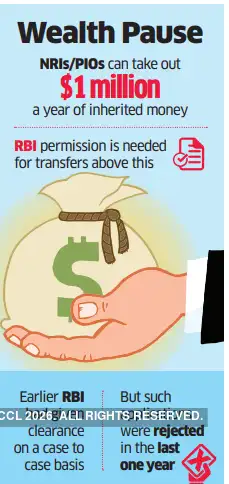Non-resident Indians, persons of Indian origin, and overseas citizens of India can remit up to $1 million a year from assets which they had either acquired during their stay in India as residents or received as part of the family heirloom.
Any remittance request beyond $1 million per financial year needs the approval of the Reserve Bank of India (RBI). The regulations allow the RBI to permit higher remittances if the absence of fund transfer would cause hardship to the person staying overseas, or the need for remittance arose on account of legacy, bequest, or inheritance.
Earlier, the regulator used to give the go-ahead to transfers beyond the permissible remittance limit on grounds mentioned in its responses to FAQs (frequently asked questions) on ‘remittance of assets’. However, this has virtually come to a halt in the last year, senior practitioners told ET.
“Till 2021-22, RBI had allowed remittance beyond $1 million a year on a case to case basis. But in the last 18 months, RBI cited the regulations to turn down many applications. RBI should once again allow such remittances for NRIs who are settled abroad, particularly those who migrated years ago. They should be allowed to take out the proceeds from sale of property and shares. For those who are old, a million-dollar limit is too small for them to remit the entire amount in their lifetime. Also, those who need it for inheritance planning and meet high medical expenses, it would lessen the hardship. The law gives RBI the power to permit larger remittances. There are instances where resident Indians, transferring funds under the liberalised remittance scheme (LRS), have received waivers from RBI to remit beyond $2,50,000 for medical treatment or pay fees to universities. But such benefits are not being made available to NRIs for remittance of assets beyond $1 million,” said Rajesh Shah, partner at the CA firm Jayantilal Thakkar & Co.Under LRS, a resident individual is allowed to buy shares, properties, and other permissible capital assets by transferring through banks upto $250,000 a year from her tax paid money.

The $1 million asset remittance limit for any NRI does not apply to funds which are transferred from overseas to India for acquisition of shares or properties. The limit only relates to assets inherited or which were acquired as a resident in India.
“Overseas remittance of amounts from NRO accounts is limited to $1 million per year. This limit, however, doesn’t apply to remittance of current income. Further while one can approach for a specific approval for remitting amounts beyond $1 million, RBI seems more keen to consider this as a policy change and relook at the limit of $1 million which has been prescribed some time ago and hasn’t been adjusted to factor in inflation and other changed circumstances,” said Moin Ladha, partner at the law firm Khaitan & Co. (An NRO or non-resident ordinary account is used by many NRIs to manage their deposits or income in India.)
While there is a widely shared perception among NRIs (who find their family wealth stuck in India) that the government and RBI should raise the amount to at least $5 million, recent years have seen a general tightening of regulations on outflow of funds.
For instance, the changes made in overseas investment rules in 2022 restrict investment in unlisted offshore debt securities and require a resident to bring back the gains from investments under LRS within six months — raising confusion on how overseas bank accounts (needed for receipt of dividends among other things) can be kept operation if all gains are to be transferred back home.
With RBI sticking to the $1 million limit and in the absence of any restriction on transfers of current income, NRIs would have to invest their inherited money in Indian assets and markets to collect dividends, rents, and interests which (unlike proceeds from sale of capital assets) can be remitted freely.











